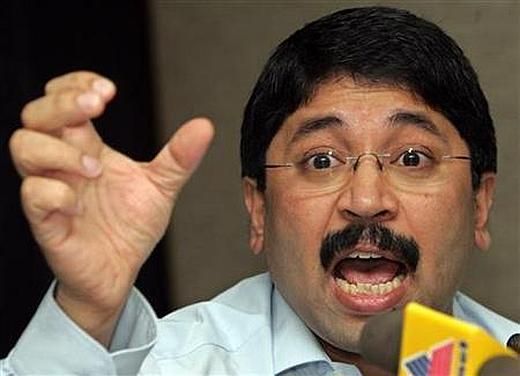
Former Telecom Minister Dayanidhi Maran, his brother Kalanidhi Maran and six others were on Friday chargesheeted before the special 2G court in the Aircel-Maxis deal case by the CBI, which is probing the money trail of around Rs 600 crore (Rs 6 billion) allegedly used as bribe.
Besides the Maran brothers, the CBI has named Malaysian business tycoon T Ananda Krishnan, Malaysian national Ralph Marshall and four firms, including Sun Direct TV Pvt Ltd and Malaysia's Maxis Communication Berhad, as accused in the case.
They have been chargesheeted for the offences punishable under section 120-B (criminal conspiracy) of the IPC and under relevant provisions of the Prevention of Corruption Act.
The charge sheet was filed before Special CBI Judge O P Saini who fixed it for consideration on September 11.
According to CBI sources, Dayanidhi Maran, during his tenure as Telecom Minister from February 2004 to May, 2007, had allegedly abused his official position and showed undue favour to Ananda Krishnan-owned company in lieu of which the business tycoon bought equity subscription shares of Sun Direct TV Pvt Ltd and accused firm South Asia Entertainment Holding Ltd which were managed by the Marans.
The sources said that in the garb of investment in equity subscription shares, "illegal gratification" of around Rs 600 crore was given to the Marans.
Besides these accused, Ex-Telecom Secretary J S Sharma, who has died, has also been named in the CBI's charge sheet. However, his name has been put in a column of the accused against whom trial cannot proceed.
One of the four companies chargesheeted by CBI is ASTRO All Asia Network PLC. The charge sheet was filed a day after the Supreme Court turned down the plea of Dayanidhi Maran seeking to restrain CBI from filing the charge sheet, saying that investigation in the case is still going on.
CBI, in the Supreme Court, had alleged that Maran had "forced" Chennai-based telecom promoter C Sivasankaran to sell the stake in Aircel to Malaysian firm Maxis Group in 2006 owned by Ananda Krishnan.
The 72-page charge sheet includes the names of 151 CBI witnesses and a set of 655 documents, which were brought in the courtroom in nine boxes, on which the agency has relied in its investigation.
While placing the charge sheet before the court, the CBI prosecutor said that scanning of documents related to the case was going on and they need some time to complete it.
"Prayer for some time is sought for scanning of documents which is still in progress. Put up for consideration on cognisance on September 11," the judge said.
Giving details of the charge sheet, the CBI sources said that during his tenure Maran had not granted telecom licences to Sivasankaran's Aircel, Aircel Cellular Ltd and Dishnet Wireless Ltd citing lack of some regulatory approvals.
This led to constricting business environment for the company, the sources said, adding thereafter Ananda Krishnan's Maxis Group, in connivance with Maran brothers, acquired the three firms.
As soon as the Maxis group acquired Sivasankaran's firms, telecom licences were granted to it by the Telecom Ministry, they said. Sources also said around Rs 600 crore was routed to the companies owned by Marans through ASTRO All Asia Network PLC.
Earlier, in a status report filed in the apex court, which is monitoring 2G scam probe, CBI had said that during 2004-07 when Maran was the Telecom Minister, Sivasankaran was coerced to sell the stake in Aircel to Maxis Group.
According to CBI, the Malaysian firm was favoured by Maran and granted licence within six months after taking over Aircel in December 2006. The agency had told the apex court that overseas probe was being delayed due to the influence of the firm's owner in Malaysia who is "powerful politically".
It had informed the apex court that overseas probe was important to track the money trail as the funds for the deal had come through Mauritius. Maran, who has been examined by CBI, has denied all the allegations levelled against him and his family members.
The agency had also sought information from the Malaysian authorities through Letters Rogatory (LRs) but it did not get satisfactory response, after which the judicial requests were sent again. The reply to second LR is pending.










 © 2025
© 2025